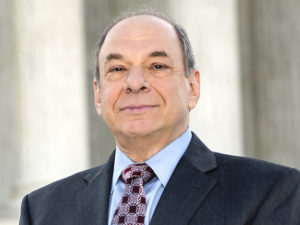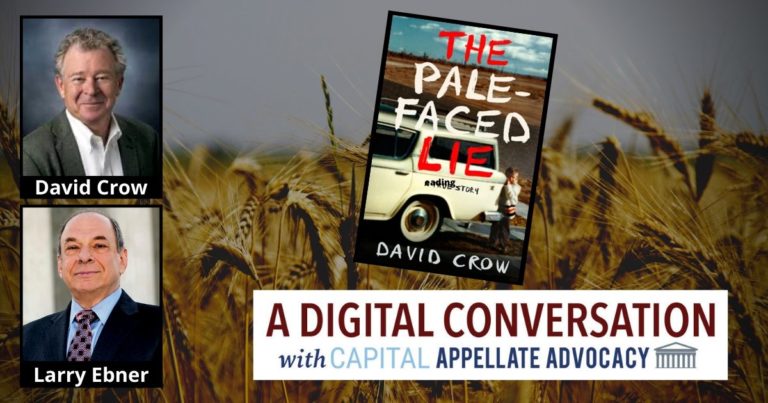David Crow is President of D.C. Legislative and Regulatory Services (DCLRS), a bipartisan lobbying and government relations firm representing a diverse group of clients before Congress and federal regulatory agencies. David founded DCLRS almost 30 years ago. He and I have worked together on many client matters involving agricultural, wood preservative, and other types of federally regulated pesticides.
David also is the author of The Pale-Faced Lie, a widely praised autobiography which tells the true and gripping story of David’s difficult family experiences while growing up on the Navajo Indian Reservation in Arizona.
David accepted my invitation to join me in a digital conversation, where we discuss his approach to lobbying and government relations, and how his challenging childhood may have influenced his successful career.
Larry Ebner:
David, you and I have been working together on client matters for two decades. How did you become a Washington, D.C.-based government relations consultant, and why the focus on agriculture and pesticides?
David Crow:

My early years were spent in a rural part of the U.S., so I was drawn to farmers and ranchers. It was pure luck that got me started in agriculture since my first boss on Capitol Hill was on the House Agriculture Committee. Now, over 40 years later, I feel very fortunate. Working in agriculture, including on agricultural inputs such as pesticides and fertilizers, has opened a whole new world for me. I still enjoy it to this day.
Larry Ebner:
What impacts has the pandemic had on agriculture?
David Crow:
The pandemic has hurt everyone, including farmers. Thankfully, however, they are still able to produce enough food and fiber to feed America and a good portion of the world. It has been said that society is “seven missing meals from anarchy.” We can all be thankful that American agriculture is as productive as ever. There have been supply chain issues, and trade continues to be an issue, but our farmers stand strong.
Larry Ebner:
With so many people in the government and private sectors still working from home, what effect has the pandemic had on your lobbying and other government relations activities?
David Crow:
Everyone is government and the private sector has been impacted, and some far more than others. We are adjusting to Zoom-based hearings, congressional visits, and even fundraisers. Thankfully, my partners at DCLRS have strong ties to Capitol Hill and the agencies. Our phone calls, texts, and emails are returned promptly, and that allows us to function as well as possible in this chaotic time.
Larry Ebner:

When you are representing an industry or company with an interest in pending congressional legislation, what have you found are the best ways for you to convey your client’s message?
David Crow:
We are fortunate to have very loyal, long-time clients. They trust us, and we trust them. We also pride ourselves in knowing about their industries. The client always knows what is best, and we are their partner in helping them approach the government in a way that gives them the best chance for a favorable outcome.
Larry Ebner:
You also represent clients in connection with regulatory matters before USDA, EPA and other federal departments and agencies. How does your interaction with the Executive Branch differ from your approach on congressional issues?
David Crow:
Executive Branch departments and agencies, as you well know from your own decades of experience interacting with them, are the “workhorses,” keeping the wheels of government moving regardless of politics. We have built relationships with federal regulators over time so they trust us to be honest, and accurate in describing our clients’ issues. We have a very healthy respect for their knowledge and work ethic, and they allow us to make our case. It is a system that works well. They disagree with us from time to time, but they always give us a fair opportunity and that’s all you can ask for.
Larry Ebner:
How do you go about dealing with numerous individual state legislatures and agencies?
David Crow:
DCLRS has worked with the various states and their legislatures through the years. We often work through state lobbying associations, or with individual companies that do business in a state. Firms that purely work on state issues have a wide entre into the state capitals, including with state legislatures, agencies, and civil servants. We often find it is best to work in coalitions and with professionals that work inside a particular state.
Larry Ebner:
I know from our many years working together that you advise many trade associations as well as individual companies. To what extent do you help industry groups set their own legislative and regulatory agendas?
David Crow:
DCLRS has been privileged to work with associations and individual companies for nearly 30 years. It’s our job to understand their interests and to help them shape policy with our input. We are their partners too. Some of the finest minds I know work in the association world. It is a true blessing to have access to their talent and to work with them to understand the political world and have an impact on policy outcomes.
Larry Ebner:
Let’s change the subject. A few months ago I read your fascinating autobiographical book, The Pale-Faced Lie, about your difficult childhood. What motivated you to write the book?
David Crow:
You are so kind to ask about my book. As you know, I had a unique childhood growing up on the Navajo Indian Reservation. My father was released from the San Quentin Penitentiary before I was born for a crime that could have gotten him the death penalty.
In the 1950’s and 60’s, when we lived on the Reservation, just about anyone with a skill would get a job with the Navajos. Today, they have a highly educated workforce and have less need for outside help. But back then my father was able to put together a career first with El Paso Natural Gas Company and later the Bureau of Indian Affairs, without admitting that he was a violent felon. He faked some recommendations and got away with it. Also, he felt certain his accomplice would never find him in Navajo country. He was right on both counts.
My book begins with my father telling me we have to get rid of my mentally ill mother. The book moves from childhood thefts my father forced on me all the way to me stopping him from murdering my stepmother using my younger sister as accomplice and hostage. I kept much of what happened to me and my siblings to myself, but once I forgave my father for what he did, I wrote the book hoping it would help others. I have been gratified to receive an outpouring of appreciation from readers.
Thank you Larry for helping me along the way as well.
Larry Ebner:
What wisdom or lessons do you want readers to take away from the book?
David Crow:
Readers need to know that it doesn’t matter how humble or horrid your childhood is, you can overcome it. In my case there was anger and shame. Somehow I believed my childhood was my fault and that I didn’t deserve a good life. I put myself in a self-imposed prison until I forgave, then I forgave myself and a whole new life opened up for me.
Larry Ebner:
Have your childhood experiences been helpful to you in your career?
David Crow:
I tell people that enough happened to me by my tenth birthday to give me a Ph.D. In human relations. Living as a minority on an Indian reservation, and having to deal with a violent father and mentally ill mother, toughened me up, but it also widened my perspective. Working with members of Congress and their staffs can be challenging, but my approach is to understand before trying to be understood. Having a wild and diverse background has been invaluable.
Larry Ebner:
Are you thinking about writing a sequel?
David Crow:
I am hard at work on book two and hope it will be as well received as my first one.
Larry Ebner:
Thank you, David, for this digital conversation. If readers have questions or comments, what is the best way to reach you directly?
David Crow:
Readers can reach me at my business email, dcrow@dclrs.com, or at dcrow@davidcrowauthor.com.

